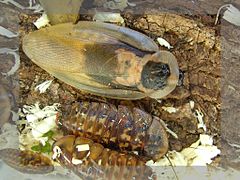Exopterygota
| Exopterygota Temporal range: Carboniferous–Recent
| |
|---|---|

| |
| Death's head cockroach Adult (above) and two immatures | |
| Scientific classification | |
| Kingdom: | |
| Phylum: | |
| Subphylum: | |
| Class: | |
| Subclass: | |
| Infraclass: | |
| Superorder: | Exopterygota
|
| Orders | |
|
Caloneurodea (Extinct) For orders previously in the Exopterygota, see Dictyoptera and Paraneoptera.[1] | |
The Exopterygota [2] are a superorder of insects. They are in the subclass Pterygota in the infraclass Neoptera.
In Exopterygotes the young resemble adults but have externally-developing wings. They undergo a modest change between immature and adult, without going through a pupal stage. The nymphs develop gradually into adults through a process of moulting.
The Exopterygota are a diverse insect superorder, divided into eight orders. They include locusts, thrips, and lice among other types of insects.
They are distinguished from the Endopterygota (or Holometabola) by the way in which their wings develop. Endopterygota (meaning literally "internal winged forms") develop wings inside the body and undergo an elaborate metamorphosis involving a pupal stage. Exopterygota ("external winged forms") develop wings on the outside of their bodies without going through a true pupal stage, though a few have something resembling a pupa.
References
[change | change source]- ↑ David A. Grimaldi & Michael S. Engel (2005). "The Paraneopteran Orders". Evolution of the insects. Volume 1 of Cambridge Evolution Series. Cambridge University Press. pp. 261–330. ISBN 9780521821490.
- ↑ also known as Hemipterodea
